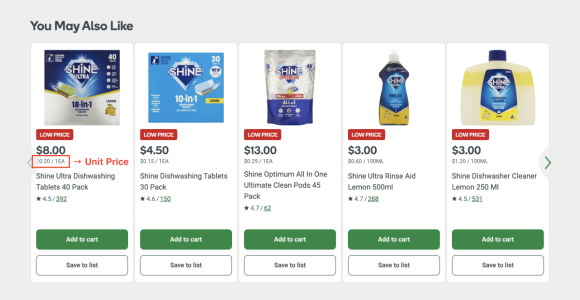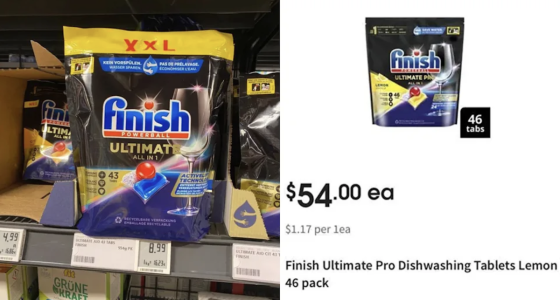Discover the Astonishing Reason Why Prices Drop Like Crazy Overseas – An Aussie Expat Tells All!
By
VanessaC
- Replies 0
For most of us, popping out to the supermarket for some household essentials is a normal part of our routine. But for an Aussie expat living in Germany, it was an eye-opening experience that revealed the huge difference in price between products found in Australia and overseas.
Sharing his experience on social media, the expat posted a picture of a 43-tablet bag of Finish dishwashing tablets he'd spotted in a German supermarket for €8.99 – that's the equivalent of just $14.70.
How does that compare to Australian prices? The same product in Australia, which comes with three more tablets, sells for $54 at Woolworths at full price, and even at its often 50 per cent discounted rate, it's still around double the price compared to a German supermarket!
Naturally, his post sparked a lively discussion online – and Aussies discovered that it’s not just dishwashing tablets that we’re being overcharged on! Other users chimed in to share their experiences from overseas, such as the ‘€1-2 [$1.60 - $2.30] per can’ beers they’d seen in Europe. While in Asia, another user spotted top-end Australian steaks that were 'significantly better quality than what we get at 'ColesWorth', and cheaper too'.
Finder's Consumer Sentiment Tracker has revealed just why these price differences are making such an impact. The average household spend on groceries has risen a whopping 25 per cent or $37 a week compared to last year, adding up to an eye watering extra $1,924 per household over 12 months.
That knowledge has obviously made Australians more eagle-eyed when it comes to bagging bargains, with the same survey finding that 71 per cent of households have changed their eating behaviour to cope with the costs.
So, how can you get the most bang for your buck? The Reject Shop and Bunnings are great alternatives to supermarkets for household cleaning products. Plus, Woolworths stocks cheaper alternatives to the branded products like their Shine dishwashing tablet 100-packs at $12.80 – coming out at less than 13 cents a tablet.
Price awareness is truly essential – especially when it comes to stretching those pension dollars. No one wants to spend more than they have to on essential groceries and household items. Members, here are some clever strategies you can use to keep your supermarket bills under control.
First, plan your groceries and don't be afraid to compare prices. Browse through newspapers and supermarket catalogues that arrive in your mailbox – they can also be found online. Look out for any special deals, discounts and coupons, and plan your purchases accordingly.

Second, consider 'unit pricing'. This helpful metric, often tucked away in the bottom corner of a price tag, tells you the cost per kilogram or litre, making it much easier to compare different sized products. For instance, a jumbo pack may seem like a better deal at face value, but the smaller version might actually be cheaper when you look at the unit price.
Lastly, timing is everything. Most supermarkets restock early in the day, so shopping in the morning will give you the best pick of both discounted and fresh items. Those late-night trips can also be rewarding, as many supermarkets mark down the prices on perishable products close to their sell-by dates.
Remember, every dollar saved on essentials means more in your pocket for the days ahead. Knowledge is power, especially when it comes to battling rising costs of living. Let's continue to help each other share insights and experiences, so we can all enjoy a cost-effective and comfortable lifestyle.
Let us know in the comment section if you have similar tips to share or any stories of unexpectedly low-priced products from overseas!
Sharing his experience on social media, the expat posted a picture of a 43-tablet bag of Finish dishwashing tablets he'd spotted in a German supermarket for €8.99 – that's the equivalent of just $14.70.
Naturally, his post sparked a lively discussion online – and Aussies discovered that it’s not just dishwashing tablets that we’re being overcharged on! Other users chimed in to share their experiences from overseas, such as the ‘€1-2 [$1.60 - $2.30] per can’ beers they’d seen in Europe. While in Asia, another user spotted top-end Australian steaks that were 'significantly better quality than what we get at 'ColesWorth', and cheaper too'.
Finder's Consumer Sentiment Tracker has revealed just why these price differences are making such an impact. The average household spend on groceries has risen a whopping 25 per cent or $37 a week compared to last year, adding up to an eye watering extra $1,924 per household over 12 months.
That knowledge has obviously made Australians more eagle-eyed when it comes to bagging bargains, with the same survey finding that 71 per cent of households have changed their eating behaviour to cope with the costs.
So, how can you get the most bang for your buck? The Reject Shop and Bunnings are great alternatives to supermarkets for household cleaning products. Plus, Woolworths stocks cheaper alternatives to the branded products like their Shine dishwashing tablet 100-packs at $12.80 – coming out at less than 13 cents a tablet.
Price awareness is truly essential – especially when it comes to stretching those pension dollars. No one wants to spend more than they have to on essential groceries and household items. Members, here are some clever strategies you can use to keep your supermarket bills under control.
First, plan your groceries and don't be afraid to compare prices. Browse through newspapers and supermarket catalogues that arrive in your mailbox – they can also be found online. Look out for any special deals, discounts and coupons, and plan your purchases accordingly.

Unit prices tell you the cost per kilogram or litre, making it much easier to compare different sized products. Image source: Woolworths.
Second, consider 'unit pricing'. This helpful metric, often tucked away in the bottom corner of a price tag, tells you the cost per kilogram or litre, making it much easier to compare different sized products. For instance, a jumbo pack may seem like a better deal at face value, but the smaller version might actually be cheaper when you look at the unit price.
Lastly, timing is everything. Most supermarkets restock early in the day, so shopping in the morning will give you the best pick of both discounted and fresh items. Those late-night trips can also be rewarding, as many supermarkets mark down the prices on perishable products close to their sell-by dates.
Remember, every dollar saved on essentials means more in your pocket for the days ahead. Knowledge is power, especially when it comes to battling rising costs of living. Let's continue to help each other share insights and experiences, so we can all enjoy a cost-effective and comfortable lifestyle.
Let us know in the comment section if you have similar tips to share or any stories of unexpectedly low-priced products from overseas!









